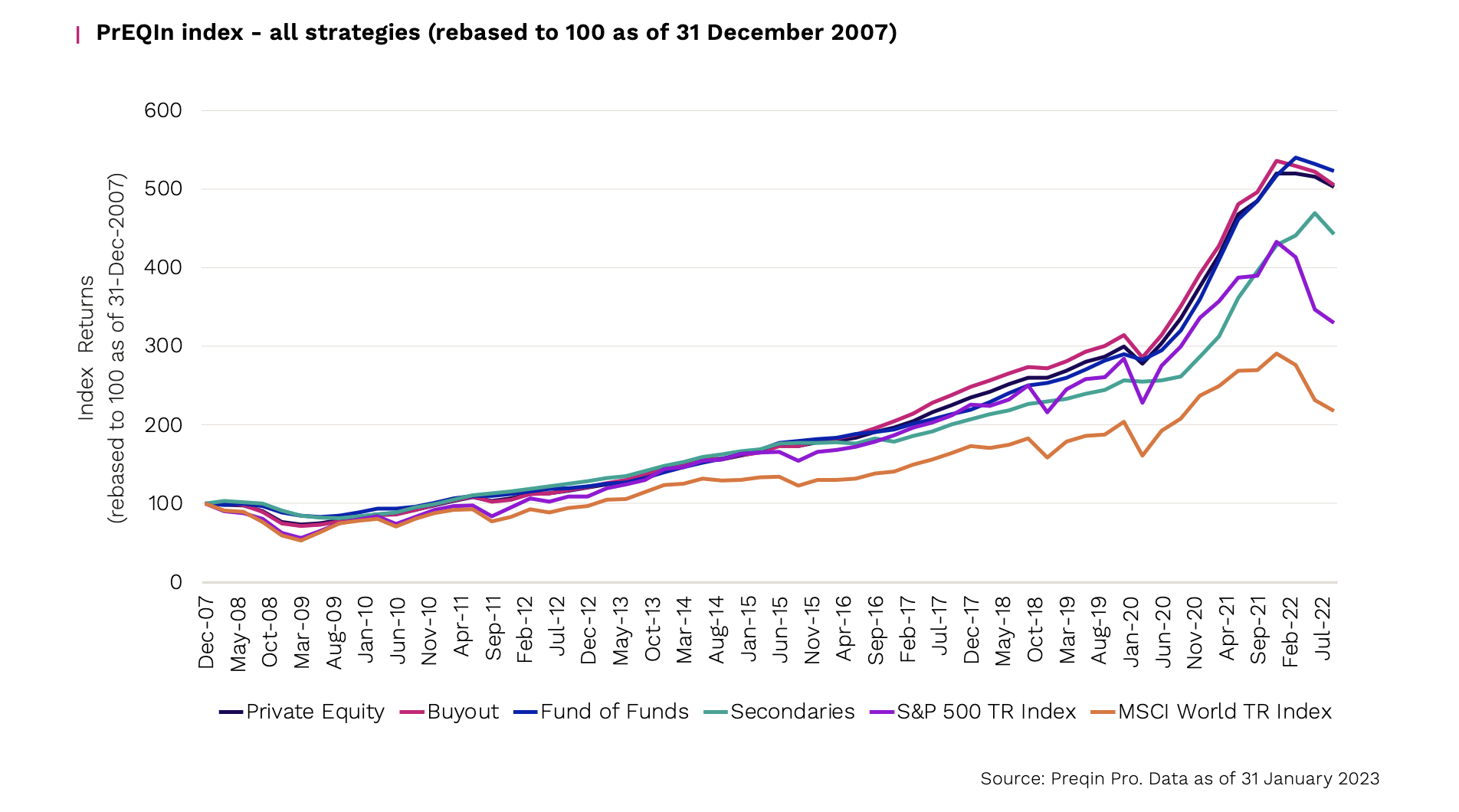Introduction
The investing world is full of jargon and acronyms, there is no denying that.
One term that you might have come across learning about investing is 'Private Equity' (PE).
{{learn_quote_1}}
Changing corporate America, no less: these are strong words by one of the Private Equity titans.
It’s certainly sure that PE has played a pivotal role in shaping industries and businesses, with successful deals such as Fortsmann Little’s investment in Gulfstream Aerospace and Blackstone's acquisition of Hilton Hotels.
Both investments led to significant returns, reflecting the high-reward potential of private equity.
But what exactly is PE, what are its characteristics compared to other types of investments, and how is it accessible?
What is Private Equity?
Private equity refers to capital investment made into private companies, or those that are not listed on a public exchange. PE firms raise funds from investors and use these funds to acquire stakes in private companies, with the intention of improving their value over time.
Private equity fund managers are expected to earn higher returns than can be found on listed markets, in exchange for a riskier strategy.
Private equity can be broadly divided into two main categories: venture capital and buyouts.
Venture capital focuses on investing in early-stage companies with high growth potential, while buyouts involve the acquisition of established companies, typically through a significant amount of debt.
Key Players in Private Equity
There are three main types of actors in the Private Equity market:
- Investors
- Fund managers
- Target companies
Investors in private equity typically include high-net-worth individuals, pension funds, insurance companies, and endowments. These investors are attracted to private equity due to its potential for high returns and its role as a diversification tool in an investment portfolio.
Fund managers act as intermediaries between the investors and the target companies. They raise funds, identify potential investment opportunities, manage the investment, and eventually aim to sell the stake at a profit. These firms leverage their financial acumen and industry knowledge to extract value from their investments.
Target companies are companies bought by fund managers to improve their value and sell them for a profit.
How Does Private Equity Work?
The life cycle of a private equity fund lasts several stages. Initially, PE firms raise capital from investors to create a new fund. This fund is then used to acquire stakes in private companies.
Once the investments are made, PE firms actively work with the management of these companies to improve operations, increase profitability, and ultimately, enhance company value. This active engagement can take several forms, including strategic guidance, operational support, and financial restructuring.
After a period, typically five to ten years, PE firms seek to exit their investments through a sale to another company, an Initial Public Offering (IPO), or a recapitalization. The proceeds from the sale are then distributed back to the investors, hopefully with a substantial return on investment.
Value Creation in Private Equity
{{learn_quote_2}}
PE firms actively engage with their portfolio companies to drive growth and improve profitability.
The drivers for value creation will be very different for an early-stage company, targeted by Venture Capital firms, and for established companies, targeted by Buy-Out firms. Still, both types of investors typically actively help the companies that they invest in.
To deep dive into the topic, here is an article on value creation strategy for Buy-Out firms.
Pros and cons of investing in Private Equity
Investing in private equity offers several potential advantages.
Firstly, it provides the potential for higher returns. According to this Preqin analysis, Private Equity as a whole has generally outperformed public markets (S&P 500 & MSCI world) significantly over the last 15 years. [1]

Secondly, private equity allows investors to access a wider range of companies and industries not available in public markets. This can offer valuable diversification opportunities and potentially reduce portfolio risk.
Lastly, private equity firms often have specialized industry knowledge and experience, which can provide unique insights and investment opportunities not readily available to average investors.
However, there are also some notable cons.
Liquidity: Private equity investments are usually illiquid, requiring investors to commit their capital for several years. This can be a disadvantage if investors need to access their capital on short notice, as it can take years to liquidate an investment in Private Equity.
Risk: the risk is also substantially higher than when investing in public markets. One reason for that is the high degree of leverage often used in private equity deals. Leverage amplifies both gains and losses, which can happen when a company underperforms or if market conditions deteriorate. Another reason is that public companies have a lot more reporting obligations, including much larger audit requirements, and a proven track record which allowed them to go from private to public, and are therefore structurally less risky than private ones.
How to Invest in Private Equity?
Traditionally, Private Equity was restricted to high-net-worth individuals (HNWIs) and institutional investors due to the high capital requirements and regulatory limitations.
However, the environment is gradually changing.
New platforms are democratizing access to the asset class. Companies like Roundtable, for example, now allow a wider range of investors to participate in Private Equity deals by lowering minimum investment requirements and offering curated portfolios.
Conclusion
All in all, Private Equity is an alternative asset class with a high-risk high-return profile, and should be included in a balanced portfolio.
Within it, different flavors exist of Private Equity firms, such as Venture Capital or Buy-Out firms.
Footnotes
[1] Since private equity companies don’t have a real-time valuation update, the performance during COVID should be evaluated accordingly
{{learn_banner}}


